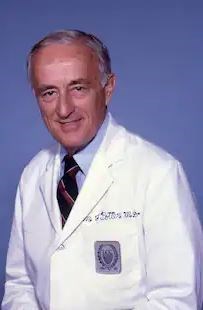
OBITUARY
The Honorable John Francis Potter, M.D.
July 26, 1925 – June 29, 2021

John F. Potter, a surgical oncologist and longtime medical school professor who was the founding director of the Georgetown Lombardi Comprehensive Cancer Center, died June 29 at MedStar Georgetown University Hospital, where he worked and taught for decades. He was 95.
The cause was pneumonitis, said his daughter Tanya Potter Adler.
Dr. Potter began his medical studies at Georgetown shortly after World War II and, except for brief periods, was associated with the university for more than 60 years.
In 1970, he became the first director of Georgetown’s cancer center, which was later named for football coach Vince Lombardi, who died that year of colorectal cancer. Dr. Potter was among the physicians treating Lombardi at Georgetown University Hospital.
“In my day, cancer was treated in a multi-factoral way,” Dr. Potter said in a 2018 video about the Lombardi Center, “and I wanted to get a center established that would meld all of these disciplines into one united whole.”
It became the country’s 16th Comprehensive Cancer Center, a designation by the National Cancer Institute denoting a facility that is a leader in cancer research as well as treatment. It is the only such center in the immediate Washington region.
“There can be no question that without John Potter, there would be no Georgetown Lombardi Comprehensive Cancer Center,” current director Louis M. Weiner said in an online appreciation.
Georgetown University President John J. DeGioia said in 2018 that Dr. Potter “represents the very best of this university.”
Dr. Potter directed the Lombardi Center for almost 20 years while also maintaining a surgical practice, conducting research and leading the surgical oncology division at Georgetown’s School of Medicine.
He was a proponent of providing psychological support for cancer patients and in the 1970s helped develop a facility with a homelike atmosphere where patients could have favorite meals and visits from relatives. The Lombardi Center also initiated one of the country’s first “life counseling” programs for children with cancer.
Dr. Potter was author of more than 60 studies in medical journals and in 1988 published a book for the general public, “How to Improve Your Odds Against Cancer,” outlining ways to protect against and cope with cancer.
John Francis Potter was born July 26, 1925, in New York City and grew up in Scarsdale, N.Y. His father worked for the company that made Crayola crayons; his mother was a homemaker.
Dr. Potter graduated from Regis High School, a selective Catholic boys’ school in Manhattan, and attended the College of the Holy Cross in Worcester, Mass. He served as a Navy corpsman during World War II.
After graduating from Holy Cross, he entered medical school at Georgetown. He graduated in 1949 and won an award for his research thesis. He was recalled to active duty in the Navy during the Korean War, then spent much of the 1950s as a resident at Georgetown and as a researcher at the National Cancer Institute. He became a full-time professor at Georgtown’s medical school in 1960.
Dr. Potter taught at Georgetown well into the 1990s and had an advisory role with the medical school until 2015. He performed more than 10,000 surgeries while serving on the staff of the university’s medical center.
He also helped launch the U.S. Military Cancer Institute, which was later merged into the John P. Murtha Cancer Center at Walter Reed National Military Medical Center. He was president and board chairman of the Association of American Cancer Institutes and served on the board of regents of the Defense Department’s Uniformed Services University of the Health Sciences. He was a longtime resident of Potomac, Md.
Survivors include his wife of 66 years, the former Tanya Kristof of Potomac; three children, Tanya Potter Adler of Potomac, Muffie Potter Aston of New York and John M. Potter of Belvedere, Calif.; and four grandchildren.
Dr. Potter said his aim at the Lombardi Center was to provide not just the finest cancer treatments but also to address the general well-being of patients.
“When you’re caring for cancer patients,” he said in 2018, “you have a daily reminder that there’s an awful lot more that has to be done, and that must be done, to save lives and to prolong lives.”
By Matt Schudel
Services were privately held for the immediate family.
Show your support
Add a Memory
Share Obituary
Get Reminders
Services
SHARE OBITUARYSHARE
- GET REMINDERS
v.1.18.0